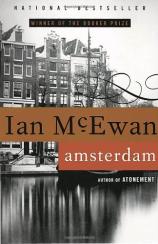Reading Group Guide
Discussion Questions
Amsterdam

1. Talk about the tone of this novel. Is it ironic? Humorous? Menacing?
2. Think about Clive and Vernon and your feelings about each at different stages of the novel. Did those feelings change? If so, at what key points?
3. In a relatively short novel, the author devotes many pages to Clive's creative process. What do you think of the author's description of the process itself and of his decision to give it so much space?
4. At one early point in the novel, Vernon Halliday thinks this about himself, "[H]e was infinitely diluted; he was simply the sum of all the people who had listened to him, and when he was alone, he was nothing at all" (page 31). Discuss this prescient statement, in light of Vernon's fate.
5. Discuss the role of lucky (and unlucky) coincidence in the novel: Vernon's rise in his profession due to "Pategate" or the story in the Judge about euthanasia in Holland that leads Clive and Vernon there.
6. Talk about the author's skill in showing the workplace; the composer's process and studio; the newspaper editor's office.
7. This novel is funny--the Siamese twins story, the sub-editor who could not spell--talk about the role of humor in the novel.
8. At different points in the novel, both Clive and Vernon think that Clive has given more to their friendship than Vernon has. Talk about the form and course of their friendship. Can friendships ever be equal?
9. The author suggests that years and success narrow life. Is this true to your experience?
10. The author withholds information throughout the novel, offering bits that are only fully developed later (the photographs of Garmony, the importance of the "medical scandal in Holland"). Talk about the author's use of suspense.
11. How shaky is Clive's moral foundation? Should he be allowed to condemn his fellow artists who "assume the license of free artistic spirit" and renege on commitments, even as Clive ignores the plight of a woman he witnesses being attacked?
12. Vernon wants to crucify Garmony for the greater good of the republic. Is this ever a valid reason to go after a politician? Do you agree with Clive that Vernon is betraying Molly's trust? Or do you side with Vernon in his wish to stop a vile leader from gaining power?
13. Talk about the parallels between the fictional political scandal the author creates and the real one that has occupied Washington, D.C., for the past year. Is the author commenting on U.S. politics and media with this novel?
14. Is everybody in Amsterdam a hypocrite?
15. Clive thinks he's a genius. How do you define genius? Does Clive fit the definition?
16. Talk about Molly and the importance of her role in the novel. Are there other examples in literature of characters who carry great weight and importance even though they never appear?
17. At Allen Crags where Clive watches the woman and man struggle, the author writes, "Clive knew exactly what it was he had to do....He had decided at the very moment he was interrupted" (page 95). Was there any question in your mind at that point about what Clive's decision was? Were you correct?
18. What do you make of the author's choice to have Clive die happy, that is, unaware that he's been poisoned, but to have Vernon grasp in his last seconds "...where he really was and what must have been in his champagne and who these visitors were" (pages 187-188).
Amsterdam
- Publication Date: November 2, 1999
- Paperback: 208 pages
- Publisher: Anchor
- ISBN-10: 0385494246
- ISBN-13: 9780385494243








